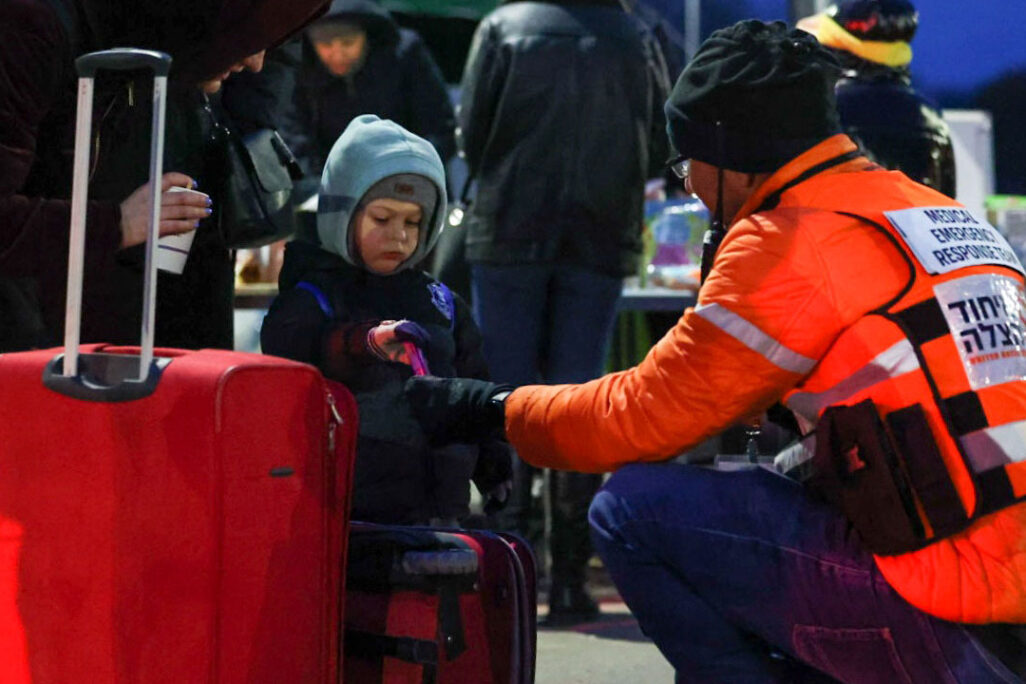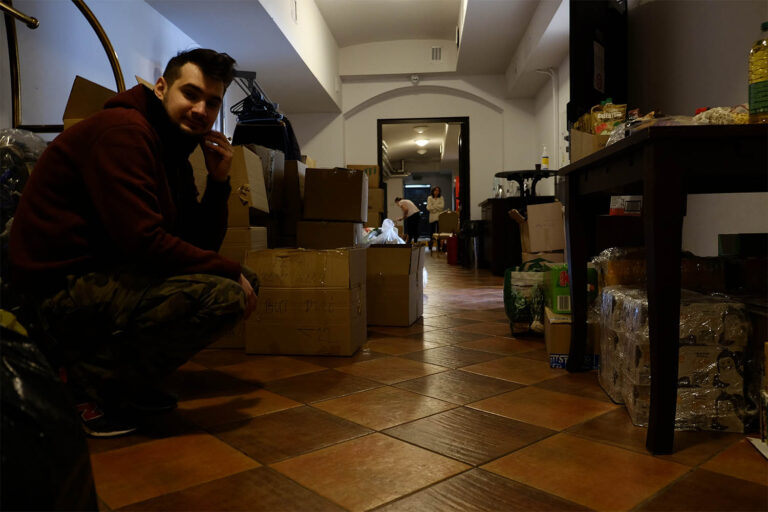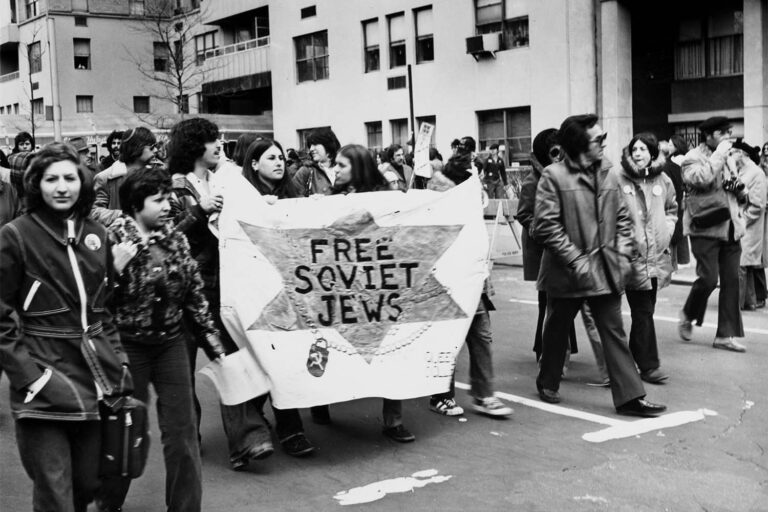
Russia’s invasion of Ukraine has revealed the true balance of power in the Jewish world – between organizations able to mobilize resources and those able to post tweets.
Helping Jews caught in the Ukraine crisis demands real investment of money, resources, and people. The Israeli government, Jewish institutions, and Israeli nonprofits acted swiftly. Meanwhile, the response of the newer, more politically oriented organizations serving American Jewry has been limited. During one of the most serious humanitarian crises in impacting European Jewry since World War II, these newer organizations have become less relevant.
As part of my work, I run the Jewish Peoplehood Coalition in Israel, a professional network of 450 leaders working to connect Israel and the diaspora. About a month ago, on February 14, I received a message from Shira Sherez-Zik, director of the Gesher Leadership Institute.
“I wanted to ask you if you think that we should do something about the Jews in Ukraine. It seems like the right thing to do, what do you think?” she wrote.
We began to discuss the possibility of assisting the Jewish community in Ukraine as it prepared for an emergency, which, at the time, we thought was still far from being realized. We did not expect that less than two weeks later we would find ourselves facing a raging war with thousands killed, including many civilians, and three million Ukrainian refugees across Europe, including many Jews from one of the largest Jewish communities in the diaspora.
In the last decade, we have begun to accept the idea expressed by the idea by former Israeli politician Yossi Beilin: “There are no longer Jews in danger, rather on the margins.” Yet Jews are still becoming refugees today.
The memory of the displacement is deeply rooted in Israel and the diaspora. Few Jews today live in the same place where their family lived a hundred years ago. Even today, Israel is one of the countries with the highest percentage in the world of foreign-born residents, with 21.2% foreign-born, the fifth-largest rate in OECD countries after distinct immigrant countries such as Luxembourg (47.3%) and Australia (29.9%). Seventy years after its founding, Israel is still a society of refugees and immigrants.
Delegations, donations, humanitarian aid
The Ukraine crisis immediately provoked powerful responses from Israeli society and the Jewish community, alongside civil society in Europe. In the weeks since the Russian invasion began, there is hardly an organization or nonprofit in Israel that has not rallied to help with the crisis, despite the government’s ambivalent political stance. Dozens (and possibly hundreds) of Israeli delegations have been sent to countries bordering Ukraine in order to assist in the absorption of refugees. These organizations include Israeli youth movements, student associations, and intentional communities.
Private businesses and high-tech companies are also donating large sums and locating Russian-speaking workers who can volunteer. Huge amounts of donated supplies are being collected throughout the country, some of which are intended for immigrants who are expected to arrive in Israel and some of which are being sent to Europe with the assistance of the Jewish Agency for Israel and government agencies.
Although Israel evacuated its diplomatic representatives from Ukraine at the beginning of the fighting, since then the government has also been providing a meaningful amount of assistance. Foreign Ministry employees are staged on all the borders, The Ministry of Diaspora Affairs has provided 20 million shekels, the Ministry of Health is constructing a field hospital, and the Jewish Agency has deployed dozens of representatives to help with aliyah. These efforts join dozens of fundraising campaigns that have raised millions from Israeli citizens for the benefit of refugees and Jewish communities.

The Jewish community across the world has also mobilized significantly. Leaders of the Jewish communities in Ukraine, such as Chabad and others, chose to stay in the fighting zone and help those who chose to stay or could not escape. In addition, international Jewish organizations such as HIAS (Hebrew Immigrant Aid Society) and the JDC (Joint Distribution Committee) have set up tents at the borders for humanitarian aid, raising millions to help with the crisis.
Synagogues in Moldova, Poland, and Romania were converted into refugee camps. Across Europe, thousands of citizens are opening their homes to take in refugees. The UJA-Federation of New York has already raised $5 million, and millions more have been raised by major religious organizations such as Agudat Israel, the Orthodox Union, and the Reform Movement. Communal organizations are also joining the effort, among them is Hazon, which supports 140 Jewish communities around the world through the Hakhel initiative, and has already sent several aid missions to Moldova and other countries.
The struggle for Soviet Jewry as a formative experience
In recent years, it has become popular to eulogize Jewish institutions, arguing that they are no longer relevant and no longer represent the younger generation that is less interested in a connection to Israel or to institutionalized Jewish life. There is truth in these claims, but when push comes to shove, these organizations, such as the federations, the JDC, and the ADL (Anti-Defamation League), have managed to lead a massive and effective action.
Beyond the organizational and economic capacity, the older, institutional Jewish organizations also have a historical and emotional connection with the Jews of Eastern Europe. A large part of the leadership of those organizations were young activists who took part in the struggle for Soviet Jewry in the 1970s, a struggle which to a large extent constituted for them a formative stage in forming the unique Jewish identity that connects Zionism, Israel, and American activism.
“Many of us were involved in the Soviet Jewry movement. Many of us did everything we could to get Jews out,” said Nancy Kaufman, former CEO of the National Council of Jewish Women, in an interview on the Hartman Institute's Identity/Crisis podcast.
“We do live in a bubble. We worry about Israel a lot. We talk about Israel a lot. When there’s a crisis in a diaspora community in Argentina and Paris or wherever there is any antisemitic event, then we come alive,” she went on. “But with what has been going on in Ukraine, in the former Soviet Union with the Jewish community, no matter what, the final chapter is on this and whether this now drives people out.”

In contrast, the younger generation of American Jewry seems more confused. Many organizations are looking for ways to lead and influence, but their action at the moment seems limited. There are two main reasons for this. First, this is a crisis on the other side of the world, and tackling it requires a lot of resources, especially donations. It’s hard to expect millennials, the first generation in modern times to be poorer than their parents, to reach into their shallow pockets and help significantly.
As a result, younger organizations mainly have influence on social media rather than in raising resources, mobilizing people, or international connections. The crisis in Ukraine reveals the relative weakness of these organizations in relation to the institutional organizations. Indeed, young people who are affiliated with more institutionalized organizations, such as the Schusterman Foundation’s ROI network, are able to provide significant assistance at an international level.
When everything is about the occupation, it’s hard to respond to a complex reality
But lack of resources doesn’t tell the whole story. The ability to respond to the crisis in Ukraine also requires flexible thought and the ability to operate in conditions of uncertainty and moral ambiguity. No organization in Israel has allocated a dedicated budget to help Ukrainian refugees, and yet many of them are providing extensive assistance. On the other hand, the war in Ukraine challenged the perceptions of many Jewish organizations, especially the radical left and the far right. After the same dogmatic organizations in recent years have been able to provide an almost ready-made answer to every issue on the world agenda, the Ukraine crisis exposes their one-dimensional worldview.
The far-right, who are accustomed to supporting the Trump-Putin alliance, are divided among themselves, in support of the “strong” Russian dictator versus the “weak” American president. In contrast, radical left-wing organizations intuitively want to support Ukraine as the underdog, but oppose American imperialism. There is a lack of response within the Jewish left, with much of the content being posted online linking the crisis in Ukraine to the Palestinian issue.
An example of this is the well-known organization If Not Now, which works to end the Israeli occupation of the Palestinian people. Since the invasion, the organization’s Instagram page, which has over 40 thousand followers, has featured just a handful of posts relating to the situation in Ukraine, and half of them compare the situation in Ukraine with the occupation.
For example, in response to Foreign Minister Yair Lapid’s condemnation of the Russian attack, the organization wrote, “Suddenly, Israel opposes a violent military occupation.” When every issue in the world is related to the occupation, there is no ability to respond in a balanced way to a complex and charged issue. There is no ability to account for the fact that the dynamic in Ukraine is very different, and that Russian violence is displacing Jews.
The concern: a future leadership crisis in the Jewish world
Overall, the State of Israel and the Jewish people in the Diaspora are responding to the crisis in an admirable way. The Jewish people are not where they were 80 years ago: they have a sovereign state, a prosperous diaspora, access to many resources, and political influence. What is worrying, however, is the lack of young leadership in the response to the Ukraine crisis. The struggle for Soviet Jewry in the 1970s forged the next generation of American Jewish leaders. The crisis in Ukraine could create the next leadership among today’s younger generation. Failure to address it could lead to a future leadership crisis, which would create a serious vacuum in the Jewish world.






